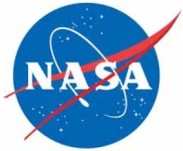Thu, Oct 04, 2007
Lunar Orbiter, Mars Science Laboratory to Be Launched Over Next
Two Years
 NASA and the Russian Federal Space
Agency Roscosmos have agreed to fly two Russian scientific
instruments on NASA spacecraft that will conduct unprecedented
robotic missions to the moon and Mars.
NASA and the Russian Federal Space
Agency Roscosmos have agreed to fly two Russian scientific
instruments on NASA spacecraft that will conduct unprecedented
robotic missions to the moon and Mars.
NASA Administrator Michael Griffin and Roscosmos head Anatoly
Perminov signed agreements in Moscow on October 3 to add the
instruments to two future missions: the Lunar Reconnaissance
Orbiter, scheduled to launch in October 2008, and the Mars Science
Laboratory, an advanced robotic rover scheduled to launch in
2009.
Russia's Lunar Exploration Neutron Detector on the Lunar
Reconnaissance Orbiter will search for evidence of water ice and
help understand astronauts' exposure to radiation during future
trips to the moon. The instrument will map concentrations of
hydrogen that may be found on and just beneath the lunar
surface.
Roscosmos' Dynamic Albedo of Neutrons instrument on the Mars
Science Laboratory will measure hydrogen to analyze neutrons
interacting with the Martian surface. The principal investigator
for both instruments is Igor Mitrofanov of the Institute for Space
Research of the Russian Academy of Science.
"Russia's contribution to the Lunar Reconnaissance Orbiter and
Mars Science Laboratory missions continues a rich and long-standing
tradition of cooperation between NASA and Russia for scientific
research in space," Griffin said. "The Institute for Space Research
has a track record of delivering excellent instrumentation, and we
are delighted to have international participation on these missions
to explore the moon and send a robotic laboratory to Mars."
The Lunar Reconnaissance Orbiter will circle the moon for at
least a year, obtaining measurements necessary to identify future
robotic and human landing sites. It also will look for potential
lunar resources and document aspects of the lunar radiation
environment.
The Mars Science Laboratory rover is a mobile research platform
that will explore a local region of the Martian surface as a
potential habitat for past or present life. The rover will carry a
suite of highly capable analytic and remote sensing instruments to
investigate planetary processes that influence habitability,
including the role of water.
More News
Also: Netherlands Donates 18 F16s, 2 737s Collide On Ramp, E-7 Wedgetail Cut, AgEagle's 100th In S Korea The Pilot and Aircraft Privacy Act was introduced in the House by Represent>[...]
Pilot Also Reported That Due To A Fuel Leak, The Auxiliary Fuel Tanks Were Not Used On June 4, 2025, at 13:41 eastern daylight time, a Piper PA-23, N2109P, was substantially damage>[...]
Have A Story That NEEDS To Be Featured On Aero-News? Here’s How To Submit A Story To Our Team Some of the greatest new stories ANN has ever covered have been submitted by our>[...]
From 2023 (YouTube Edition): Reflections on War’s Collective Lessons and Cyclical Nature The exigencies of war ought be colorblind. Inane social-constructs the likes of racis>[...]
What Goes Around, May Yet Come Back Around, Klyde FMI: www.klydemorris.com>[...]
 Airborne 06.30.25: US v ADS-B Misuse, Natl STOL Fire, Volocopter Resumes
Airborne 06.30.25: US v ADS-B Misuse, Natl STOL Fire, Volocopter Resumes NTSB Prelim: Piper PA-23
NTSB Prelim: Piper PA-23 ANN FAQ: Submit a News Story!
ANN FAQ: Submit a News Story! Classic Aero-TV: One Mans Vietnam
Classic Aero-TV: One Mans Vietnam Klyde Morris (06.30.25)
Klyde Morris (06.30.25)



